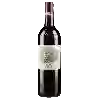
Winery Benoit Valérie CalvetClaret Bordeaux Reserve
This wine is a blend of 2 varietals which are the Cabernet-Sauvignon and the Merlot.
This wine generally goes well with poultry, beef or veal.
Food and wine pairings with Claret Bordeaux Reserve
Pairings that work perfectly with Claret Bordeaux Reserve
Original food and wine pairings with Claret Bordeaux Reserve
The Claret Bordeaux Reserve of Winery Benoit Valérie Calvet matches generally quite well with dishes of beef, veal or game (deer, venison) such as recipes of slow-cooked fillet of beef, veal cutlets parmigiana or cassoulet of the sea.
Details and technical informations about Winery Benoit Valérie Calvet's Claret Bordeaux Reserve.
Discover the grape variety: Cabernet-Sauvignon
Cabernet-Sauvignon noir is a grape variety that originated in France (Bordeaux). It produces a variety of grape specially used for wine making. It is rare to find this grape to eat on our tables. This variety of grape is characterized by small bunches, and small grapes. Cabernet-Sauvignon noir can be found in many vineyards: South-West, Loire Valley, Languedoc & Roussillon, Cognac, Bordeaux, Armagnac, Rhone Valley, Provence & Corsica, Savoie & Bugey, Beaujolais.
Informations about the Winery Benoit Valérie Calvet
The Winery Benoit Valérie Calvet is one of wineries to follow in Bordeaux.. It offers 49 wines for sale in the of Bordeaux to come and discover on site or to buy online.
The wine region of Bordeaux
Bordeaux, in southwestern France, is one of the most famous, prestigious and prolific wine regions in the world. The majority of Bordeaux wines (nearly 90% of the production Volume) are the Dry, medium and Full-bodied red Bordeaux blends for which it is famous. The finest (and most expensive) are the wines of the great châteaux of Haut-Médoc and the right bank appellations of Saint-Émilion and Pomerol. The former focuses (at the highest level) on Cabernet Sauvignon, the latter on Merlot.
The word of the wine: Flower
Wine disease resulting in a whitish haze and a vented taste.














